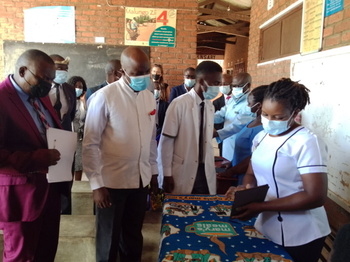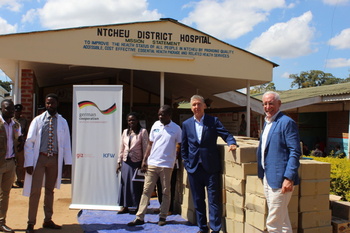Improving the healthcare of pregnant women and their babies in Malawi
Programme description
Title: Health Systems Strengthening with a focus on Reproductive Health
Commissioned by: German Federal Ministry for Economic Cooperation and Development (BMZ)
Co-funded by: The Bill & Melinda Gates Foundation
Country: Malawi
Lead executing agency: Ministry of Health
Overall term: 2020 to 2023

Context
Malawi is one of the poorest countries in the world and its health sector is heavily underfunded. Even though maternal and neonatal mortality have fallen by more than half since 1990, 439 women still die for every 100,000 live births. This is twice the global average. 27 out of every 1,000 infants die within the first month, which is 50 per cent more than in the rest of the world. By way of reference, in Germany, the numbers are six and three.
Currently, 86 per cent of women deliver in hospitals, but the quality of maternal and newborn health services remains a challenge to further reducing avoidable deaths of women and babies.
Objective
The Malawi health system in the target districts is improved in its provision of high quality maternal and newborn health services.

Approach
The Malawi German Health Programme works with the Ministry of Health and the local councils of the four target districts (Dedza, Lilongwe, Mchinji and Ntcheu) to create the conditions in which doctors, nurses and midwives can provide good maternal and newborn care. In line with the National Health Policy and the National Health Sector Strategic Plan II this includes:
- Creating a better-motivated and more skilled health workforce by applying human resource management tools
- Providing better health services based on quality standards, digital tools and the use of real time data at point of care
- Building the capabilities required for improved preparedness and responses to future epidemics.
Last update: October 2022